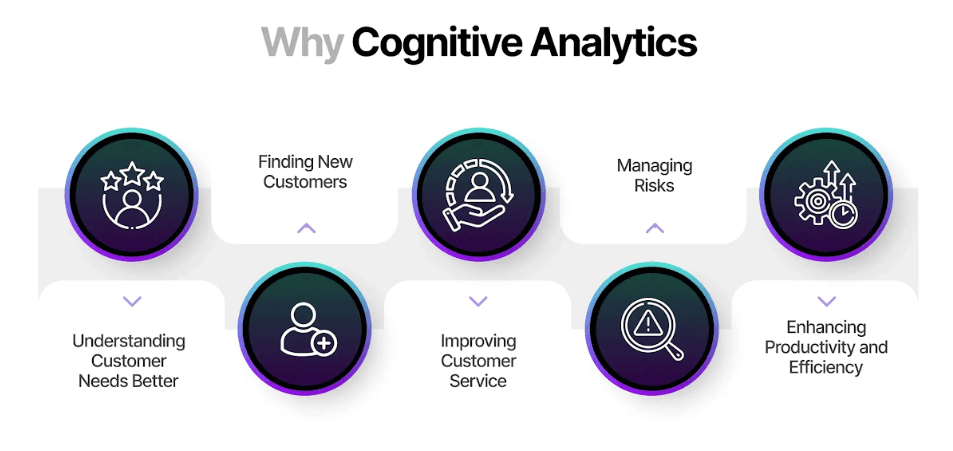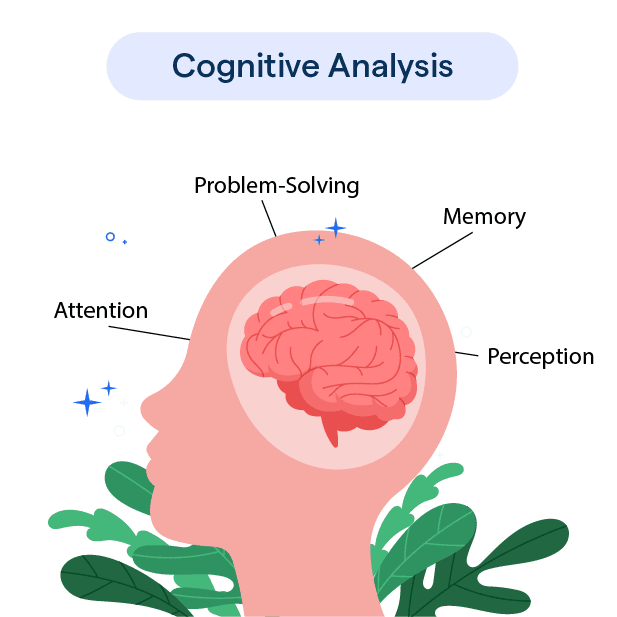What is Cognitive Analysis?
Cognitive analysis is the process of examining a person's mental processes, including perception, attention, memory, and problem-solving.
It helps researchers and professionals understand how people think and make decisions. Cognitive analysis techniques include eye-tracking, surveys, interviews, and more.
Key Components of Cognitive Analysis
The key components of cognitive analysis include attention, perception, memory, and problem-solving. Attention refers to the ability to focus on relevant information.
Perception refers to how we interpret and make sense of sensory information. Memory refers to the ability to store and retrieve information. Problem-solving refers to the ability to find solutions to complex problems.
Why is Cognitive Analysis Important?

- Enhancing Decision Making: Cognitive analysis helps businesses process vast amounts of data, identify patterns, and generate insights, enabling faster and more informed decision-making processes.
- Improving Customer Experience: By understanding user preferences and behaviors, cognitive analysis allows businesses to deliver personalized experiences, targeted marketing campaigns, and tailored product recommendations, enhancing Customer satisfaction.
- Streamlining Operations: Cognitive analysis automates routine tasks, such as content curation and customer support, freeing up time for more strategic work and improving overall operational efficiency.
- Identifying Trends and Patterns: Cognitive analysis helps businesses identify trends, monitor brand reputation, and understand customer opinions, allowing for data-driven decisions and better market positioning.
- Mitigating Risks and Fraud: By identifying patterns, anomalies, and potential threats, cognitive analysis enables businesses to take proactive measures to mitigate risks, prevent fraud, and ensure compliance with regulations.
When to Use Cognitive Analysis?
Cognitive analysis is useful for understanding and improving human cognition, decision-making, and problem-solving abilities.
- Enhancing Customer Support: Utilize cognitive analysis to understand customer queries and provide personalized, relevant, and timely responses, improving customer satisfaction and support efficiency.
- Analyzing Social Media Sentiment: Employ cognitive analysis to gauge customer sentiment on social media platforms, enabling businesses to identify trends, monitor brand reputation, and make data-driven decisions.
- Automating Content Curation: Use cognitive analysis to automatically categorize, tag, and summarize content, making it easier for users to discover relevant information and improve overall user experience.
- Streamlining Decision Making: Incorporate cognitive analysis to process large volumes of data, identify patterns, and generate insights, helping businesses make informed decisions quickly and effectively.
- Enhancing Personalization and Recommendations: Leverage cognitive analysis to understand user preferences and behaviors, enabling businesses to deliver personalized experiences, targeted marketing campaigns, and tailored product recommendations.
How to Conduct Cognitive Analysis?
- Collect and Preprocess Data: Gather relevant data from various sources, clean it, and preprocess it to ensure consistency and accuracy before using it for cognitive analysis.
- Choose Appropriate Techniques: Select the most suitable AI techniques, such as machine learning, deep learning, or reinforcement learning, based on the specific cognitive task and desired outcomes.
- Develop and Train Models: Create AI models using the chosen techniques and train them on the preprocessed data to learn patterns, relationships, and cognitive processes from the input data.
- Evaluate Model Performance: Assess the performance of the trained models on validation or test data to ensure they accurately replicate the desired cognitive processes and provide reliable results.
- Iterate and Optimize: Continuously refine and improve the AI models by tweaking parameters, incorporating new data, and updating techniques as needed to enhance the cognitive analysis capabilities of the system.
Cognitive Analysis vs. Other Analysis Techniques
Cognitive analysis is different from other analysis techniques such as behavioral analysis, emotional analysis, and social analysis.
Cognitive Analysis vs. Behavioral Analysis
Cognitive analysis focuses on mental processes such as perception, attention, memory, and problem-solving, while behavioral analysis focuses on observable behavior.
Cognitive Analysis vs. Emotional Analysis
Cognitive analysis focuses on cognitive processes, while emotional analysis focuses on emotions and feelings.
Cognitive Analysis vs. Social Analysis
Cognitive analysis focuses on individual mental processes, while social analysis focuses on the interaction between individuals and groups.
Limitations of Cognitive Analysis
- Limited Understanding of Context: Cognitive analysis systems can struggle to understand the context of a conversation or text, leading to misinterpretations or incorrect conclusions. It's like trying to crack a code without knowing the language it's written in.
- Struggles with Ambiguity: Dealing with ambiguous or unclear statements can be challenging for cognitive analysis tools, as they may not be able to discern the intended meaning. It's like trying to find your way through a maze with multiple paths, unsure of which one to take.
- Difficulty with Sarcasm and Humor: Cognitive analysis systems often have a hard time detecting sarcasm and humor, as these rely on subtle cues and cultural knowledge. It's like trying to understand an inside joke when you're not part of the group.
- Lack of Emotional Intelligence: While cognitive analysis tools can process and analyze data, they lack the emotional intelligence to understand human feelings and emotions fully. It's like trying to empathize with someone when you don't have the ability to feel emotions yourself.
- Dependence on Quality Data: Cognitive analysis systems rely on accurate and high-quality data to function effectively. If the data input is flawed or incomplete, the analysis may be inaccurate or misleading. It's like trying to solve a puzzle with missing pieces.
TL;DR
Cognitive analysis is a crucial tool in understanding how people think and make decisions. It has various applications in fields such as psychology, business, education, and healthcare.
By examining mental processes such as perception, attention, memory, and problem-solving, researchers and professionals can develop effective strategies and improve outcomes.
Frequently Asked Questions (FAQs)
What is cognitive ability?
Cognitive ability refers to a person's capacity to acquire, process, and apply knowledge. It encompasses various mental processes such as perception, attention, memory, reasoning, and problem-solving. Cognitive ability influences an individual's learning, decision-making, and overall intellectual functioning.
What is cognitive analysis in AI?
Cognitive analysis in AI involves understanding and processing human-like cognitive functions, such as learning, reasoning, problem-solving, and decision-making, using artificial intelligence techniques.
How is cognitive analysis different from traditional AI?
Cognitive analysis focuses on mimicking human cognitive processes, enabling AI systems to learn and adapt, while traditional AI relies on pre-programmed rules and algorithms.
What are some applications of cognitive analysis?
Applications of cognitive analysis include natural language processing, computer vision, speech recognition, sentiment analysis, and decision-making in various industries.
How does cognitive analysis improve AI systems?
Cognitive analysis enhances AI systems' ability to understand complex patterns, adapt to new situations, and provide more human-like interactions and responses.
What techniques are used in cognitive analysis?
Cognitive analysis employs techniques such as machine learning, deep learning, neural networks, and reinforcement learning to replicate human cognitive processes in AI systems.

